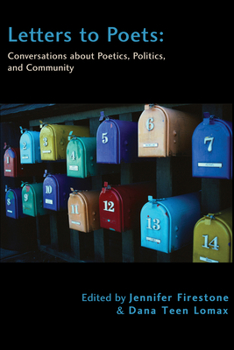Letters to Poets: Conversations About Poetics, Politics, and Community
Letters to Poets honors and commemorates the hundredth anniversary of Rilke's Letters to a Young Poet by partnering a selection of 14 of the country's leading contemporary poets with 14 emerging poets and documenting their correspondences. These poets challenge the hierarchies and pitfalls endemic to the mentoring process, and ask some of the day's toughest, most vital questions concerning race, class, and gender. Spanning a range of not only generations but cultural, aesthetic, and economic backgrounds, these diverse pairings both challenge and support each other artistically and politically. The result is in turns dramatic, enlightening, and entertaining.
Format:Paperback
Language:English
ISBN:0975499084
ISBN13:9780975499085
Release Date:October 2008
Publisher:Saturnalia Books
Length:200 Pages
Weight:1.25 lbs.
Dimensions:1.0" x 6.0" x 8.9"
Customer Reviews
4 ratings
A BOOK FOR ALL SORTS
Published by Thriftbooks.com User , 16 years ago
As a writer and avid reader, Letters to Poets is of obvious interest to me. The letters it contains offer a unique view into the minds and lives of poets. The most interesting thing however, is how this book about writers by writers also engages in discussions of politics, social issues and art. In many ways, Letters to Poets is simply about humanity- the concerns and interests of all sorts of people- written in the poignant and often funny language of contemporary poets. Personally, I found the letters between Jill Magi and Cecilia Vicuna especially revealing. In their letters, we discover two writers deeply fascinated by the role and duty of writing and art in current social and political climes. From the viewpoints of student, writer, artist, philospher- to name only a few of the roles the socially aware take on- Letter to Poets is an enjoyable and also enlightening read.
They've Got Mail
Published by Thriftbooks.com User , 16 years ago
I didn't think poets wrote letters anymore--attentive, old-fangled, pen-to-paper affairs that touch on current projects, poetics, jobs and family, political events, and sympathetic close readings of the recipient's work. Turns out they don't, or didn't until editors Dana Teen Lomax and Jennifer Firestone thought to ask them to. The upshot is 14 pairs of poets exchanging up to 3 letters over a 1-year period in time for the centenary of Rilke's Letters to a Young Poet, the model and provocation for the project. I read the book in one big sitting, egged on by the voyeuristic pleasure implicit in reading others' letters, and by the chance to hear poets talk about their work in a more relaxed and collaborative format. Some of the things I learned are that older poets, even the `outsider' ones, get around a lot (Kyoto, Rome, Morocco, Colorado, San Diego); that New York's a brutal place for poets to live in; that poetry's political efficacy is still Question #1 for writers across the "experimental" spectrum; that poetry, unlike so much else today, continues to function via personal ties of respect and (sometimes rote) affection; and that race, class, and gender still impinge on poets' consciousness in pretty much the same ways they did a generation ago. My favorite exchanges were Judith Goldman's with Leslie Scalapino, and John Yau's with Anselm Berrigan, and I was inevitably drawn to moments where the elder poet disagreed with or brought up the younger. But even the less thrilling match-ups yield something surprising, and most left me curious to know how the correspondence continued outside the window of this engaging project.
i need a mentor too
Published by Thriftbooks.com User , 16 years ago
My favorite set of letters were Truong Tran and Wanda Coleman because as a minority myself i was able to connect with the unfairness of being a writer of color and what's expected of you. Every writer has a struggle they have to work through. I thought it was great to see two poets with similar struggles talk about how to thrive as a writer of color. As stated in their letters, racism exists in the literary world and both of these writers had to speak out and fight through it. As a writer myself,i enjoyed reading about writers i like, reading their interviews and getting to know them through these letters. After reading these letters, i realized how important it is for writers to have a mentor. There are writers that influence you but you never meet them and their are mentors who influence your writing and are able to guide you.
Poetic Mentors
Published by Thriftbooks.com User , 16 years ago
I graduated from college earlier this year and realized that the most important thing that I took with me was the unique relationships that I had with my poetry professors. Nothing is more personal, or more individual, than writing poetry, but exchanging ideas, recommendations of other poets to read, personal experiences, and new writing with my classmates, as well as my professors, changed the experience of writing poetry from just something within oneself, to something that can be thrown on a table, discussed, critiqued, changed, and even enjoyed. The meaningful conversations between my professors, myself, and the other students helped to shape my own writing, as well as my college experience. I feel like this book takes those same aspects of speaking about poetry and life in a raw and passionate way, and brings it to the next level. To read personal accounts and streams of thought from poets that I have read and respect, as well as discover some exciting emerging voices, it only proved to me the strength of relationships with a mentor, and how to simply create a conversation can change and expand your thoughts on your life, and your craft.





